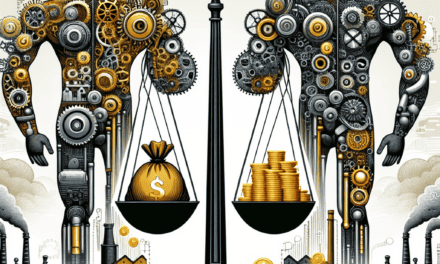“Steadfast Leadership: Powell Holds Ground Amidst Political Pressure”
Introduction
Federal Reserve Chairman Jerome Powell has maintained a steadfast position amidst potential pressure from former President Donald Trump to resign. Despite facing criticism and calls for his removal during Trump’s administration, Powell has consistently emphasized the importance of the Federal Reserve’s independence and its commitment to making decisions based on economic data rather than political influence. His resolve underscores the central bank’s role in ensuring stable economic growth and managing monetary policy without succumbing to external political pressures. Powell’s leadership has been marked by a focus on transparency and communication, reinforcing the Fed’s dedication to its dual mandate of promoting maximum employment and stable prices.
Powell’s Independence: Navigating Political Pressures
Federal Reserve Chair Jerome Powell has consistently emphasized the importance of maintaining the central bank’s independence, a stance that has become particularly significant amid potential political pressures. As the head of the United States’ central banking system, Powell’s role is crucial in steering the nation’s monetary policy, a responsibility that requires a delicate balance between economic objectives and political neutrality. This balance is especially pertinent in light of potential pressures from former President Donald Trump, who has previously expressed dissatisfaction with Powell’s policy decisions.
During Trump’s presidency, there were numerous instances where he publicly criticized Powell, primarily over interest rate policies. Trump argued that higher interest rates were detrimental to economic growth and his administration’s economic agenda. Despite these criticisms, Powell remained steadfast in his commitment to the Federal Reserve’s dual mandate of promoting maximum employment and stabilizing prices. This commitment underscores the importance of the Fed’s independence from political influence, a principle that Powell has repeatedly defended.
In recent times, speculation has arisen regarding whether Trump, if re-elected, might pressure Powell to resign. However, Powell has made it clear that he intends to serve his full term, which is set to end in 2026. This resolve is not merely a personal stance but a reflection of the broader institutional integrity of the Federal Reserve. The central bank’s independence is vital for maintaining credibility in financial markets and ensuring that monetary policy decisions are made based on economic data and analysis rather than political expediency.
Powell’s firm stance against potential political pressure is not without precedent. Historically, the Federal Reserve has faced various challenges in maintaining its independence. For instance, during the 1970s, then-Fed Chair Arthur Burns faced significant pressure from the Nixon administration to adopt policies that would support short-term economic growth, even at the risk of long-term inflation. Such historical examples highlight the ongoing tension between political interests and the central bank’s mandate.
Moreover, Powell’s approach aligns with the broader global consensus on central bank independence. Around the world, central banks are generally structured to operate independently of political influence, a design intended to foster stable economic environments. This independence allows central banks to make decisions that may be unpopular in the short term but are necessary for long-term economic health.
In navigating these political pressures, Powell has also emphasized the importance of clear communication. By articulating the rationale behind the Federal Reserve’s decisions, Powell aims to build public trust and understanding, which are crucial for the effective implementation of monetary policy. This transparency helps to demystify the often complex world of central banking and reinforces the Fed’s commitment to its mandate.
In conclusion, Jerome Powell’s determination to uphold the Federal Reserve’s independence in the face of potential political pressure is a testament to his commitment to the institution’s integrity. By prioritizing economic data and analysis over political considerations, Powell not only safeguards the credibility of the Federal Reserve but also ensures that its policies are aligned with the long-term interests of the U.S. economy. As the global economic landscape continues to evolve, the importance of a politically independent central bank remains as critical as ever.
The Role of the Federal Reserve in Political Turmoil
In the intricate landscape of American governance, the Federal Reserve stands as a pillar of economic stability, tasked with the crucial responsibility of managing the nation’s monetary policy. At its helm, the Chair of the Federal Reserve plays a pivotal role in steering the economy through turbulent times. Jerome Powell, the current Chair, has been a steadfast figure in this regard, navigating the complexities of economic policy amidst a backdrop of political turbulence. Recently, speculation has arisen regarding potential pressure from former President Donald Trump for Powell to resign. However, Powell has remained resolute, underscoring the independence of the Federal Reserve from political influence.
The Federal Reserve’s independence is a cornerstone of its ability to effectively manage the economy. This autonomy allows it to make decisions based on economic indicators rather than political considerations, ensuring that monetary policy serves the long-term interests of the nation. Powell’s firm stance against potential political pressure highlights the importance of this independence. By resisting calls to resign, he reinforces the principle that the Federal Reserve must operate free from external political forces, a principle that has been upheld by his predecessors.
During his tenure, Powell has faced numerous challenges, from navigating the economic fallout of the COVID-19 pandemic to addressing concerns about inflation and employment. His leadership has been characterized by a commitment to transparency and communication, providing clear guidance on the Federal Reserve’s policy intentions. This approach has been instrumental in maintaining market stability and public confidence in the institution. Moreover, Powell’s ability to remain focused on the Federal Reserve’s dual mandate—maximizing employment and stabilizing prices—demonstrates his dedication to the core objectives of the central bank.
The potential for political interference in the Federal Reserve’s operations is not a new phenomenon. Historically, there have been instances where political figures have sought to influence monetary policy for short-term gains. However, the Federal Reserve’s structure is designed to mitigate such risks, with the Chair serving a four-year term that does not coincide with the presidential election cycle. This design is intended to insulate the institution from political pressures and ensure that its decisions are guided by economic realities rather than political expediency.
Powell’s resolve in the face of potential pressure from Trump is a testament to the enduring strength of the Federal Reserve’s institutional framework. By standing firm, he not only protects the integrity of the Federal Reserve but also upholds the broader principle of central bank independence, which is vital for maintaining economic stability. This independence is crucial, particularly in times of political turmoil, as it allows the Federal Reserve to act as a stabilizing force, providing a steady hand in guiding the economy through uncertainty.
In conclusion, Jerome Powell’s steadfastness in the face of potential political pressure underscores the critical role of the Federal Reserve in maintaining economic stability. His commitment to the institution’s independence is a reminder of the importance of insulating monetary policy from political influence. As the Federal Reserve continues to navigate the complexities of the modern economy, its ability to operate free from external pressures will remain essential in ensuring the long-term prosperity of the nation. Through his leadership, Powell reaffirms the enduring value of an independent central bank, a principle that is fundamental to the health and stability of the American economy.
Historical Precedents: Fed Chairs and Political Challenges
In the annals of American economic history, the relationship between the Federal Reserve and the executive branch has often been a delicate balancing act. The Federal Reserve, an independent entity, is tasked with managing the nation’s monetary policy, a role that requires it to operate free from political pressures. However, this independence has occasionally been tested by the political ambitions of sitting presidents. A notable instance of this dynamic is the steadfast stance of Jerome Powell, the current Chair of the Federal Reserve, against potential pressure from former President Donald Trump to resign.
Historically, the Federal Reserve has faced challenges from various administrations, each with its own economic agenda. For instance, during the Nixon administration, Fed Chair Arthur Burns was reportedly pressured to keep interest rates low to ensure a favorable economic environment for Nixon’s re-election campaign. This historical precedent underscores the tension that can arise when political objectives clash with the Fed’s mandate to maintain economic stability.
Fast forward to the Trump administration, and a similar narrative unfolded. President Trump was vocal in his criticism of Powell, particularly regarding interest rate hikes that he believed were detrimental to economic growth. Trump’s public disparagement of Powell was unprecedented in its frequency and intensity, raising concerns about the potential erosion of the Fed’s independence. Despite this, Powell remained resolute, emphasizing the importance of the Federal Reserve’s autonomy in decision-making processes.
Powell’s determination to uphold the Fed’s independence is not merely a personal stance but a reflection of a broader institutional ethos. The Federal Reserve’s credibility hinges on its ability to make decisions based on economic data and analysis, rather than political expediency. This principle is vital for maintaining investor confidence and ensuring the stability of financial markets. Powell’s resistance to political pressure serves as a reminder of the critical role that central bank independence plays in safeguarding the economy.
Moreover, Powell’s experience is not unique in the history of the Federal Reserve. Paul Volcker, who served as Fed Chair from 1979 to 1987, faced significant political pressure during his tenure. Volcker’s aggressive interest rate hikes to combat inflation were unpopular with both the public and politicians, yet he persisted, ultimately succeeding in stabilizing the economy. This historical example illustrates the challenges Fed Chairs often face when their policy decisions conflict with short-term political goals.
In light of these historical precedents, Powell’s firm stance against potential pressure from Trump can be seen as part of a broader tradition of Fed Chairs prioritizing economic stability over political considerations. This tradition is crucial for maintaining the integrity of the Federal Reserve and ensuring that it can effectively fulfill its mandate.
In conclusion, the relationship between the Federal Reserve and the executive branch is inherently complex, shaped by historical precedents and the ever-present tension between political objectives and economic imperatives. Jerome Powell’s tenure as Fed Chair exemplifies the challenges and responsibilities that come with maintaining the Federal Reserve’s independence. By standing firm against potential political pressure, Powell not only upholds the legacy of his predecessors but also reinforces the foundational principles that underpin the Federal Reserve’s role in the American economy.
Trump’s Influence on Economic Policy: A Closer Look
In the complex landscape of U.S. economic policy, the interplay between political influence and financial governance often becomes a focal point of discussion. Recently, this dynamic has been underscored by the steadfast position of Federal Reserve Chair Jerome Powell amidst potential pressure from former President Donald Trump to resign. This situation highlights the intricate balance between political aspirations and the independence of financial institutions, a balance that is crucial for maintaining economic stability.
During his presidency, Donald Trump was known for his outspoken views on economic policy, often expressing dissatisfaction with the Federal Reserve’s decisions, particularly regarding interest rates. Trump’s criticism of Powell was no secret, as he frequently took to social media and public forums to voice his discontent. Despite this, Powell has consistently emphasized the importance of the Federal Reserve’s independence, asserting that decisions should be based on economic data and analysis rather than political considerations. This commitment to autonomy is vital, as it ensures that monetary policy remains focused on long-term economic health rather than short-term political gains.
The potential pressure from Trump for Powell to resign raises questions about the extent of political influence on economic policy. While the President appoints the Federal Reserve Chair, the institution is designed to operate independently, free from direct political control. This structure is intended to prevent economic decisions from being swayed by the political climate, thereby safeguarding the economy from volatile shifts in policy. Powell’s firm stance against resigning under political pressure underscores the importance of this independence, reinforcing the notion that the Federal Reserve’s primary responsibility is to the economy, not to political figures.
Moreover, Powell’s resolve can be seen as a reaffirmation of the Federal Reserve’s role in maintaining economic stability. By resisting potential pressure to resign, Powell is upholding the principle that monetary policy should be guided by economic indicators and expert analysis. This approach is crucial for fostering confidence among investors, businesses, and the public, as it signals that economic decisions are being made with careful consideration and expertise.
In addition to highlighting the importance of the Federal Reserve’s independence, this situation also sheds light on the broader implications of political influence on economic policy. When political figures attempt to exert pressure on financial institutions, it can lead to uncertainty and instability in the markets. Investors may become wary of potential shifts in policy, leading to fluctuations in stock prices and economic growth. By standing firm against such pressure, Powell is helping to mitigate these risks, ensuring that the Federal Reserve remains a stabilizing force in the economy.
Furthermore, Powell’s stance serves as a reminder of the broader principles that underpin effective economic governance. Transparency, accountability, and independence are essential components of a robust financial system, and they are crucial for maintaining public trust. By adhering to these principles, Powell is not only protecting the integrity of the Federal Reserve but also reinforcing the foundation of the U.S. economy.
In conclusion, Jerome Powell’s firm position against potential pressure from Donald Trump to resign highlights the critical importance of maintaining the independence of financial institutions. This independence is essential for ensuring that economic policy is guided by data and expertise rather than political considerations. As the U.S. continues to navigate complex economic challenges, the steadfastness of leaders like Powell serves as a vital reminder of the principles that underpin a stable and resilient economy.
The Importance of Central Bank Autonomy
In the realm of economic governance, the autonomy of central banks is a cornerstone of financial stability and policy effectiveness. This principle has been underscored by recent developments involving Federal Reserve Chair Jerome Powell, who has made it clear that he intends to remain steadfast in his role despite potential pressures from former President Donald Trump to resign. The independence of central banks, such as the Federal Reserve, is crucial in ensuring that monetary policy decisions are made based on economic indicators and expert analysis rather than political considerations. This separation is vital for maintaining market confidence and fostering an environment where long-term economic strategies can be developed and implemented without undue influence from transient political agendas.
The Federal Reserve, like other central banks around the world, is tasked with managing monetary policy to achieve macroeconomic objectives such as controlling inflation, maximizing employment, and stabilizing the financial system. To effectively fulfill these responsibilities, the Fed must operate independently of political pressures that could skew its decision-making processes. Jerome Powell’s firm stance against resigning in the face of potential political pressure highlights the importance of this independence. It serves as a reminder that central banks must be insulated from political cycles to maintain their credibility and effectiveness.
Moreover, the autonomy of central banks is not merely a theoretical ideal but a practical necessity. Historical examples abound where political interference in central banking has led to adverse economic outcomes. For instance, when central banks are pressured to keep interest rates artificially low to spur short-term economic growth, it can lead to inflationary spirals and asset bubbles. Conversely, political demands for austerity measures during economic downturns can exacerbate recessions and prolong recovery periods. Thus, the ability of central banks to make decisions based on economic data and forecasts, free from political influence, is essential for sustainable economic health.
In addition to safeguarding economic stability, central bank independence also plays a critical role in maintaining investor confidence. Financial markets closely monitor the actions and communications of central banks, and any perception of political interference can lead to volatility and uncertainty. Investors rely on the predictability and transparency of central bank policies to make informed decisions. Therefore, any suggestion that a central bank’s decisions are being swayed by political considerations can undermine trust and lead to destabilizing market reactions.
Furthermore, the global nature of today’s financial systems means that the actions of one central bank can have far-reaching implications. The Federal Reserve, in particular, holds significant influence over global financial markets due to the U.S. dollar’s status as the world’s primary reserve currency. As such, the Fed’s ability to operate independently is not only crucial for the U.S. economy but also for the stability of international financial systems. Jerome Powell’s commitment to maintaining this independence is a testament to the broader importance of central bank autonomy in a globally interconnected economy.
In conclusion, the independence of central banks is a fundamental aspect of effective economic governance. Jerome Powell’s resolve to resist potential political pressure underscores the critical need for central banks to operate free from political influence. This autonomy ensures that monetary policy decisions are made in the best interest of long-term economic stability, fosters investor confidence, and supports the stability of global financial systems. As such, preserving the independence of institutions like the Federal Reserve is essential for maintaining the integrity and effectiveness of economic policy-making.
Powell’s Tenure: Achievements and Controversies
Jerome Powell’s tenure as the Chair of the Federal Reserve has been marked by a series of significant achievements and controversies, reflecting the complex landscape of modern economic governance. Appointed by President Donald Trump in 2018, Powell has navigated the U.S. economy through turbulent times, including trade wars, a global pandemic, and the subsequent economic recovery. Despite these challenges, Powell has maintained a steady hand on the monetary policy tiller, emphasizing the importance of data-driven decision-making and transparency.
Under Powell’s leadership, the Federal Reserve has implemented several key policies aimed at stabilizing and stimulating the economy. One of his notable achievements was the swift and decisive response to the economic fallout from the COVID-19 pandemic. The Fed slashed interest rates to near-zero levels and launched an unprecedented bond-buying program to inject liquidity into the financial system. These measures were instrumental in preventing a deeper economic downturn and fostering a quicker recovery. Moreover, Powell’s commitment to maintaining low interest rates has supported job growth and helped reduce unemployment to pre-pandemic levels.
However, Powell’s tenure has not been without controversy. His relationship with former President Trump was notably strained, with Trump frequently criticizing Powell for not lowering interest rates quickly enough. Despite this pressure, Powell remained steadfast in his approach, prioritizing the Fed’s independence and long-term economic stability over short-term political considerations. This tension highlighted the delicate balance central banks must maintain between political influences and economic imperatives.
In addition to political pressures, Powell has faced criticism from some quarters regarding the Fed’s handling of inflation. As the economy rebounded from the pandemic, inflationary pressures began to mount, leading to concerns about the potential overheating of the economy. Critics argue that the Fed was slow to recognize the persistence of inflation and adjust its policies accordingly. In response, Powell has acknowledged the challenges posed by inflation but has emphasized the Fed’s commitment to using its tools to ensure price stability over the medium term.
Furthermore, Powell’s tenure has seen increased scrutiny of the Federal Reserve’s role in addressing broader societal issues, such as climate change and economic inequality. While the Fed’s primary mandate is to ensure maximum employment and stable prices, there is growing debate about its responsibility to consider the broader impacts of its policies. Powell has cautiously engaged with these discussions, recognizing the importance of these issues while maintaining that the Fed’s tools are limited in addressing them directly.
As Powell continues his tenure, the question of his potential resignation under pressure from political figures like Trump remains a topic of speculation. However, Powell has consistently demonstrated a commitment to the principles of central bank independence and has shown resilience in the face of external pressures. His focus remains on steering the U.S. economy through its current challenges, with an eye on fostering sustainable growth and stability.
In conclusion, Jerome Powell’s leadership of the Federal Reserve has been characterized by a blend of achievements and controversies. His ability to navigate complex economic landscapes while maintaining the Fed’s independence underscores the critical role central banks play in modern economies. As he stands firm against potential political pressures, Powell’s tenure serves as a testament to the importance of principled leadership in safeguarding economic stability.
The Future of the Federal Reserve Under Political Scrutiny
In recent years, the Federal Reserve has found itself at the center of political discourse, with its independence frequently scrutinized by various political figures. The institution, which plays a crucial role in shaping the economic landscape of the United States, has traditionally operated with a degree of autonomy to ensure that monetary policy decisions are made based on economic indicators rather than political pressures. However, this independence has been tested, particularly during the tenure of former President Donald Trump, who often expressed dissatisfaction with the Fed’s policies and leadership. As the political climate continues to evolve, the future of the Federal Reserve remains a topic of significant interest and concern.
Jerome Powell, the current Chair of the Federal Reserve, has been a focal point in this ongoing narrative. Appointed by Trump in 2018, Powell has faced criticism from the former president, who at times publicly called for his resignation. Trump’s dissatisfaction stemmed from the Fed’s interest rate policies, which he believed were hindering economic growth. Despite this pressure, Powell has consistently maintained that the Federal Reserve’s decisions are guided by economic data and analysis, rather than political influence. This steadfast commitment to the Fed’s independence is crucial, as it ensures that monetary policy remains focused on long-term economic stability rather than short-term political gains.
The potential for political interference in the Federal Reserve’s operations raises important questions about the institution’s future. As the U.S. economy navigates challenges such as inflation, employment fluctuations, and global economic uncertainties, the Fed’s ability to operate without political constraints is more important than ever. Powell’s leadership has been characterized by a careful balancing act, aiming to address these economic challenges while preserving the Fed’s autonomy. His approach underscores the importance of maintaining a clear separation between monetary policy and political agendas.
Moreover, the broader implications of political scrutiny on the Federal Reserve extend beyond the immediate concerns of interest rates and economic growth. The perception of the Fed as an independent entity is vital for maintaining confidence in the U.S. financial system. Any erosion of this perception could have far-reaching consequences, potentially affecting everything from investor confidence to international economic relations. Therefore, Powell’s firm stance against potential political pressure is not just about defending his position but also about safeguarding the integrity of the institution he leads.
Looking ahead, the Federal Reserve’s ability to navigate political scrutiny will likely continue to be a defining aspect of its operations. As new administrations come into power and economic conditions evolve, the Fed will need to remain vigilant in upholding its independence. This will require not only strong leadership but also a commitment to transparency and communication with the public. By clearly articulating the rationale behind its decisions, the Fed can help mitigate political pressures and reinforce its role as a stabilizing force in the economy.
In conclusion, Jerome Powell’s resolve in the face of potential pressure from political figures like Donald Trump highlights the ongoing challenges faced by the Federal Reserve. As the institution continues to play a pivotal role in shaping the U.S. economy, its independence remains a cornerstone of its effectiveness. Ensuring that the Fed can operate free from political interference is essential for maintaining economic stability and confidence in the financial system. As such, the future of the Federal Reserve will depend on its ability to uphold these principles amidst an ever-changing political landscape.
Q&A
1. **What is the main issue discussed?**
Jerome Powell’s stance against potential pressure from President Trump to resign as the Federal Reserve Chair.
2. **Who is Jerome Powell?**
Jerome Powell is the Chair of the Federal Reserve.
3. **What is President Trump’s position regarding Powell?**
President Trump has reportedly expressed dissatisfaction with Powell’s performance and has considered pressuring him to resign.
4. **How has Powell responded to the potential pressure?**
Powell has stated that he would not resign if pressured by President Trump.
5. **Why might Trump want Powell to resign?**
Trump has criticized Powell for the Federal Reserve’s interest rate policies, which he believes have hindered economic growth.
6. **What is the significance of Powell’s stance?**
Powell’s refusal to resign underscores the independence of the Federal Reserve from political influence.
7. **What are the potential implications of this situation?**
This situation could lead to increased tensions between the Federal Reserve and the White House, potentially impacting financial markets and economic policy.
Conclusion
Federal Reserve Chairman Jerome Powell’s firm stance against potential pressure from former President Donald Trump to resign underscores the independence and resilience of the Federal Reserve in maintaining its autonomy from political influence. Powell’s commitment to his role, despite external pressures, highlights the importance of central bank independence in ensuring stable economic policy and maintaining market confidence. This situation reaffirms the Fed’s dedication to its mandate of promoting maximum employment and stable prices, free from political interference.





